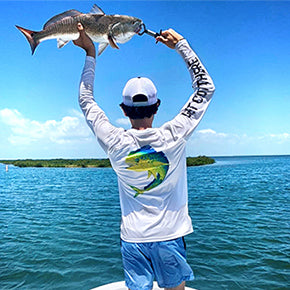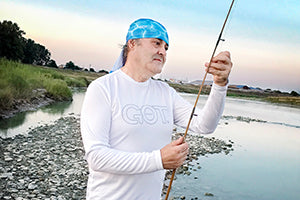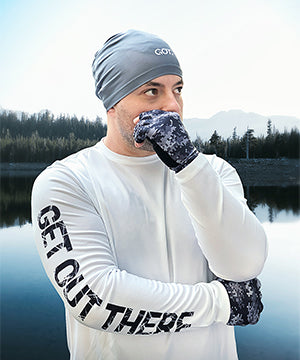Lake, River or Ocean Fishing?
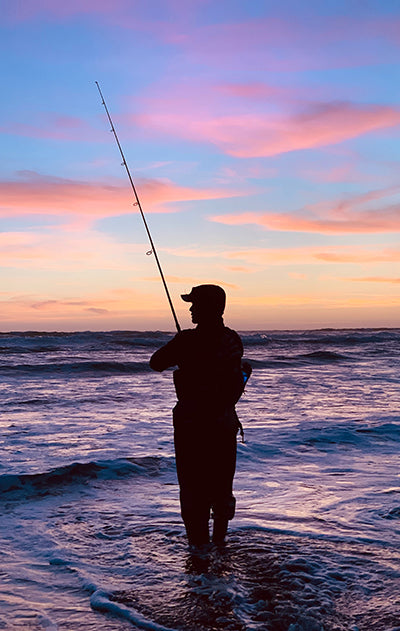
Fishing can help you unwind, and if you want to give it a try you need to understand the differences between every fishing place, as it offers different experiences and presents particular challenges, so it’s best to know more before getting into it.
Just click/tap on the links below to jump to the desired section:
1. Freshwater vs Saltwater Fishing
2. Is Ocean Fishing Easier than Lake or River Fishing?
3. Go for Big or Small Fish?
4. Dangers and safety tips
5. Check Regulations and Respect Nature
6. What fishing gear do you need?
Freshwater vs Saltwater Fishing
Saltwater fishing is when you cast your line into the ocean, while freshwater fishing is when you fish in rivers or lakes where the water has low salinity - less than 1%.
There has been a long debate on whether freshwater or saltwater is better, easier, or more enjoyable. Searching this topic on forums or blogs, you'll come across different opinions.
Taking into consideration fishing styles, equipment, and so on, the fact is that fishing in freshwater is different than in saltwater, and vice versa.
Is Ocean Fishing Easier than Lake or River Fishing?
It depends on the level of experience because the process of catching a fish is different on a lake, river, or ocean.
Ocean fishing can be challenging for a beginner, due to weather conditions, strong waves, and huge fish that put up a fight.
That’s why it’s better to start with freshwater fishing as it is a more peaceful experience. You can cast your line over a lake or pond, from a bridge, or by the shore. Even if you don't catch anything initially, it is still a relaxing activity to engage in.
Calmer waters provide an excellent opportunity to learn new techniques and improve your fishing skills.
Fish Big or Small?
Freshwater Fish
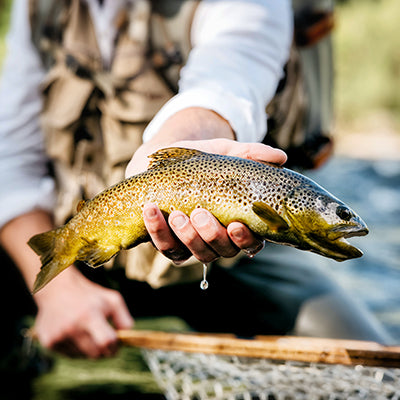
They’re just a bit easier to catch, are smaller, and put up less fight than their saltwater counterparts. If the water hasn’t been filled with other species, depending on where you decide to angle, the most common fish you’ll find in freshwater are Smallmouth and Largemouth Bass, Crappie, Brook Trout, Rainbow Trout, Channel Catfish, and Walleye.
You can also find some big fish like Pike and Carp that can grow to over 30 pounds.
Did you know? The largest freshwater fish of all is the sturgeon, growing up to 80 inches long and more than 100 pounds. Some sturgeons live exclusively in freshwater, while others inhabit marine environments near the coast, venturing into the ocean.
Sturgeons are ancient fish species that have been around since the time of the dinosaurs. Now they're a highly endangered species on the brink of extinction due to habitat destruction, overfishing, pollution, and overexploitation for caviar.
Saltwater Fish
The fish closer to the shore are smaller, so if you want to see some huge ones, you must go fishing offshore (sea depth of 50-100 feet) or try deep sea fishing (sea depth of +100 feet).
But catching a saltwater fish is a bit more demanding than with freshwater. They’re larger, powerful, and can pull you over, so you’ll need a greater strength to reel them in.
Because of this it’s best to avoid the sea if you’re a beginner and are afraid of handling some really robust and combative fish. Even if it’s more challenging, many experienced anglers find the adrenaline of the big game a lot more exciting.
From shore to deep sea, you can often find in saltwater fish like Striped bass, Bonefish, Snapper, Bluefish, Halibut, Redfish, Red drum, Tarpon, Tuna, Mahi Mahi, Sailfish, and many more.
Be aware of what might happen, and keep safe
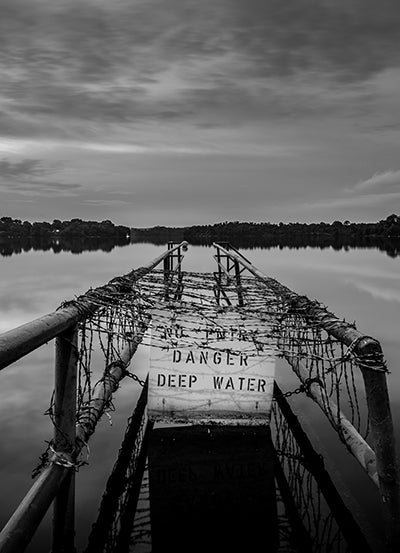
Lakes are considered a safer place to fish, although large lakes can have rough waters. When boating be cautious of the lake's depth and other hidden obstacles.
Rivers are generally more dangerous than lakes due to their constant flow, currents, and steep banks, and require your utmost attention. Research the river before launching your kayak or boat into the water.
The Ocean's strong winds and waves can limit your fishing from a surfboard, kayak, or small boat. Don't go too far, always keep the shoreline in sight so you won’t get lost, and get information about the water in the region.
To catch bigger fish you need to go offshore boating, which can be risky. Getting lost in the Ocean is a real possibility, so ask for the help of a reliable guide. Alternatively, you can book a spot on a charter boat to make the experience more enjoyable.
So whether you want to go fishing on a lake or the ocean, keep in mind these safety tips:
• Know the waters you want to navigate on
• Go fishing with someone who can assist in case of an emergency
• Be cautious while handling sharp hooks
• Avoid making a cast close to other people, and regularly look around before casting
• Put on a life jacket whenever you are in, on, or around the water
Check Local Regulations and Respect Nature
Before packing your gear for that next fishing trip, it’s important to know the rules of the waters you’re fishing on. Check with the local authorities and research ahead of time the area and the species you plan to fish.
Be responsible and practice conservation! Show respect for our natural resources and preserve them for future generations. Never leave anything behind, especially containers or packaging made of plastic, including fishing lines that can threaten the lives of birds and other wildlife.
Pick up, Carry out, and Recycle!
How to choose your fishing gear
Freshwater Fishing Rods
Fishing in freshwater is often more affordable, so it's a popular choice if you're starting. All you need is a fishing pole, line, and a hook.
However, if you plan on boating or kayaking on a lake or river, you'll need better equipment. Look for a fishing rod that can handle the weight and strength of a fighting fish without cracking. You can consult with your local fishing tackle shop for more information.
Also thanks to the milder weather conditions, freshwater fishing equipment requires less maintenance and can last longer.
Saltwater Fishing Rods
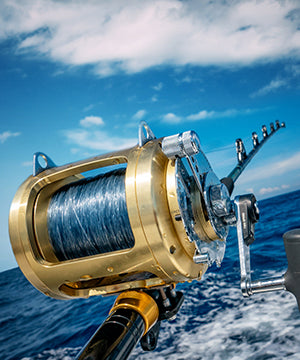
The ocean has strong waves and bigger and powerful fish. You'll need a tough and rust-resistant fishing rod that withstands the saltwater corrosion and the fish's force that tries to pull away.
These rods are usually larger and longer than the freshwater ones, and the best ones are made from flexible fiberglass, which provides the necessary durability and flexibility for ocean fishing.
A metal rod can easily deteriorate from the salt, so it's important to wash it with fresh water after each use, to remove any salt residue and prevent corrosion.
Q: Can a saltwater fishing rod be used in freshwater?
Yes. Its robust and durable design makes it useful for lake and river fishing as well.
Q: And how about using a freshwater rod in saltwater?
Some rods can be used for ocean fishing, if they can withstand the fish’s weight, but you can’t ask a freshwater fishing rod to resist the force of a deep sea fish like Marlin, Sailfish, or Mahi Mahi. And after every trip remember to wash the rod meticulously so it won’t erode.
And what else?
Fishing Clothes
Fishing is an exciting outdoor activity, and it's important to choose the right gear. As you prepare to embark on your fishing expedition, whether at sea or on a river or lake, make sure you dress accordingly.
Consider the weather conditions, and wear comfortable apparel so you can move with ease. Dress in layers to stay warm in cold weather, and wear lightweight, breathable, and moisture-wicking clothes in hot temperatures.
Don’t forget about UV protection!
Staying out in the Sun is pleasant, but it has its drawbacks and it can be too much. In summer you can damage your skin if your clothes aren’t designed for Sun protection.
Choose items with a high UPF (UV Protection Factor), as these are manufactured to protect your skin from harmful ultraviolet radiation. Don’t confuse SPF with UPF as it’s not the same thing.
We’ve covered this topic in the article >> SPF vs UPF. What’s the difference?
Look for a higher UPF rating (50+ is the greatest), because this number indicates a greater skin coverage, so you can get a better sun protection. You can read more here >>> How to choose UPF rated clothing

View our collections: GOT® UPF 50+ long-sleeve shirts, hoodies, balaclavas, bucket hats, and tubular neck gaiters in solid colors or with fun designs and patterns like Sailfish, Mahi Mahi, Largemouth Bass, Water ripples, Digital Pixel Camo, Dry Grass, American flag and many more! Choose your favorite and Get Out There with confidence!
Tags beginner, clothing, fishing, how to, outdoor, saltwater vs freshwater, summer -

